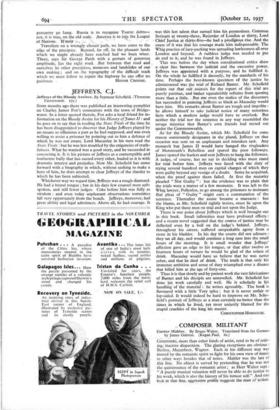JEFFREYS, C.J.
Soho months ago.there was published an interesting pamphlet on Charles James Fox's connexions with the town of Bridge- water. In a letter quoted therein, Fox asks a local friend for in- formation on the Bloody Assize for his History of lames II : and he goes on to say that in reading the State Trials of the time he thas'been disappointed to discover that Judge, Jeffreys played by no means so villainous a -part as he had supposed, and was even willing to assist a prisoner by pointing out to him a defence of which he was not aware. Lord Macaulay in his turn read the State Trials : but he was less troubled by the exigencies of truth- fulness. What he wanted was a good story, and he succeeded in concocting it. It is his picture of Jeffreys as a contemptible and loathsome bully that has ousted every other, loaded as it is with dramatic interest' and prejudice. Now Mr. Schofield has come forward with a biography in which, without seeking to make a hero of him, he• does attempt to clear Jeffreys of the slander to which he has been subjected.
Whichever way we regard him, leffreys was a rough diamond. He had a brutal tongue ; but in his days few counsel were soft- spoken, and still fewer judges. Coke before him was fully as virulent :.and even today unpleasant observations sometimes fall very opportunely from the bench. Jeffreys, moreover, had great ability and legal adroitness. Above all, he had courage. It was this last talent that earned him his promotions. Common Serjeant at twenty-three, Recorder of London at thirty, Lord - Chief justice arthirty-five—he had a prodikious rise. And the cause of it was thit his courage made him indispensable. The Whig practice of jury-packing was spreading lawlessness all over London and beyond. A ruthless judge was needed to put an end to it, and he was found in Jeffreys.
This was before the day when constitutional critics drew a-clear line bettireen the judicial and the executive power. Jeffreys. was appointed with a purpose, and he fulfilled it. On the whole he fulfilled it decently, by the standards of his time. Perhaps the best-known specimen of the justice he administered was the trial of Richard Baxter. Mr. Schofield points out that our sources -for the report of this trial are purely partisan,*and *rather squeainishly refrains from quoting more than A little. --But 6st even the malice of the dissenters has succeeded in painting Jeffreys as black as Macaulay would have him. His remarks about Baxter are 'rough and impolite : he allows himself to take judicial notice of many notorious facts which a modern judge would have to overlook. But neither the trig nor the sentence in any way resembled the savage injustice that Baxter's own friends had meted out under the Commonwealth. • As' for the Bloody Assize, which Mr. 'Schofield for some reason consistently designates in the. plural, Jeffreys on that occasion was sent on an unpleasant and mistaken task. Any monarch but James II would have hanged the ringleaders of Monmouth's Rebellion and spared the poor followers. James 'spared the leaders and sent Jeffreys, to hang the followers. A judge, of course, has no say in deciding who must stand for trial before him. -Jeffreys was faced with the duty of trying several hundred men on capital charges of which they were guilty beyond any vestige of a doubt. Some he acquitted, when the proof against them failed. At first the majority pleaded " Not Guilty " : but the evidence was so plain that the trials were a matter of a few moments. It was left to the Whig lawyer, Pollexfen, to go among the prisoners to insinuate That pleas of " Guilty " Might earn' a commutation of the sentence. Thereafter the assize became a massacre : but the blame, as Mr., Schofield rightly insists, must lie upon the King who put these men on trial and not upon the Judge.
There is one point about Jeffreys which is well brought out in this book. Small infirmities may have profound effects : and a recent -novel suggested that the course of justice may be deflected even by a . boil. on she judge's behind. Jeffreys, throughout his career, suffered unspeakable agony from a stone in his bladder. In his day the courts did not adjourn : they sat all day, and would continue along case into the small hours of the morning. It is small wonder that Jeffreys' affliction gave an edge to his tongue, or that after twelve or fourteen hours of torture he would be glad of the solace of drink. Macaulay would-have us believe that he was never Sober, and that he died of drink. The truth is that only his immense ambition and sense of duty triumphed over a disease that killed him at the age of forty-one.. .
' Thus it is that slowly and by patient work the vast fabrications of Burnet and his disciple are unravelled. Mr. Schofield has done his work carefully and well. He is scholarly in his handli4 of the material :, he writes agreeably. The book 'is flavoured with a little Tory spice : but it is never unfair or lop-sided. It would indeed be hard to improve on Mr. Scho- field's portrait of Jeffreys as a man certainly no better than the times in- which he lived, yet most unjustly blamed for the stupid cruelties of the king his master.
CHRISTOPHER HOBFIOUSE.






























































 Previous page
Previous page